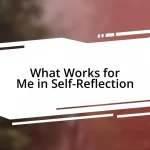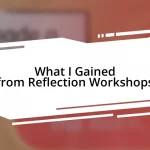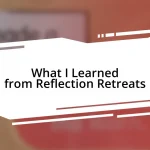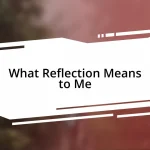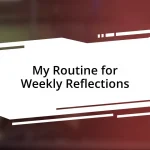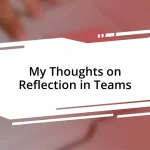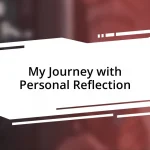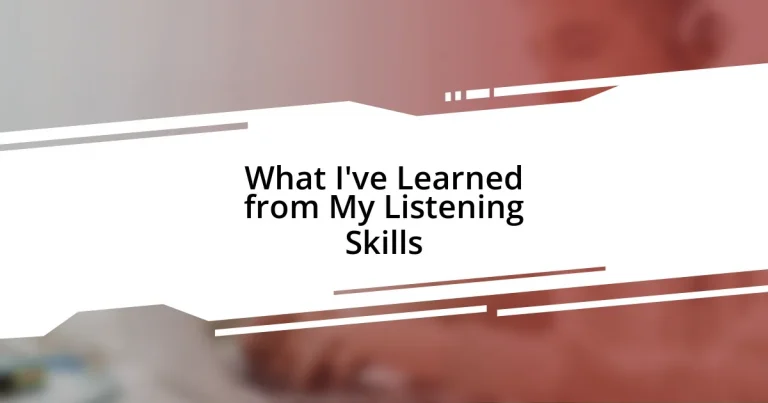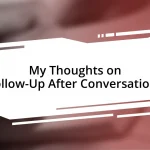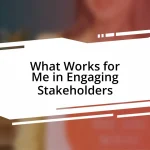Key takeaways:
- Active listening fosters deeper connections and trust in personal and professional relationships.
- Techniques like eliminating distractions, asking clarifying questions, and practicing mindfulness can significantly improve listening skills.
- Barriers to effective listening include preconceived notions, external distractions, and emotional barriers that can hinder understanding.
- Applying listening skills in everyday interactions transforms conversations, enhances empathy, and aids conflict resolution.
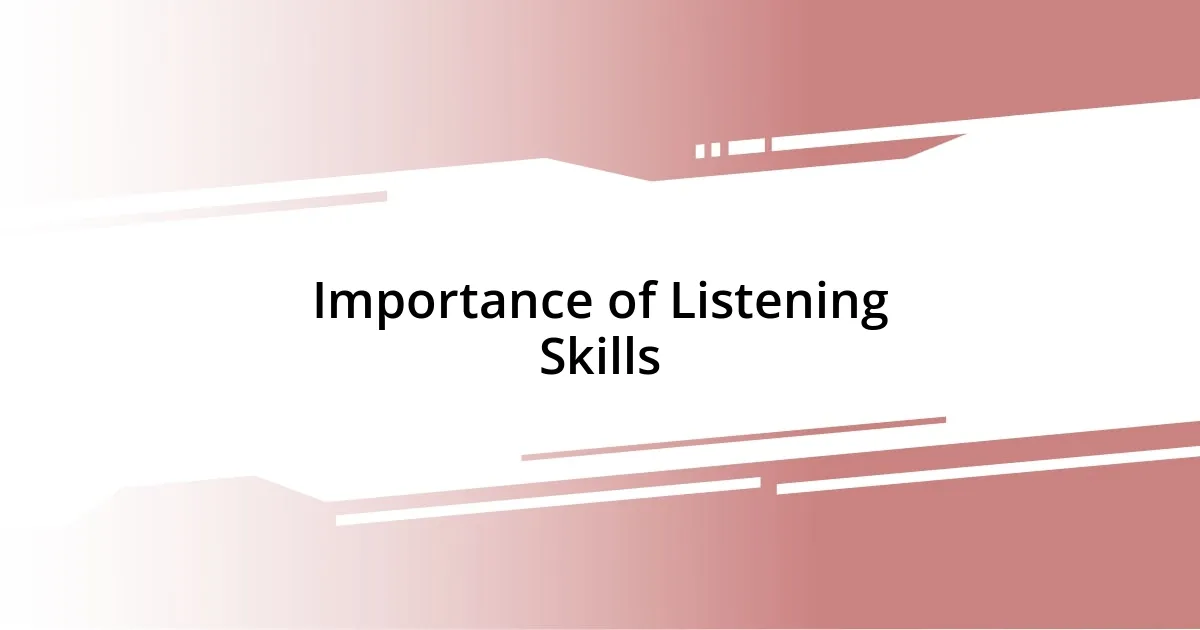
Importance of Listening Skills
Listening skills are truly the foundation of effective communication. I remember a time when I was in a heated discussion with a friend, and instead of focusing on my rebuttal, I paused to really listen to what they were saying. In that moment, I realized how much understanding can shift the dynamics of a conversation—it’s about more than just waiting for your turn to speak.
When we actively listen, we create deeper connections, both personally and professionally. I’ve experienced this firsthand at work during team meetings. When I genuinely engaged with my coworkers’ ideas, not only did I foster an environment of trust, but I also sparked innovative solutions that came from collaborative brainstorming. Doesn’t it feel rewarding when people feel heard?
Moreover, effective listening can prevent misunderstandings that often lead to conflicts. I once misinterpreted a close friend’s concerns because I was too wrapped up in my own perspective. Had I taken the time to listen deeply, I could have avoided hurt feelings and strengthened our friendship instead. So, how often do we prioritize truly hearing others over simply hearing them? It’s worth reflecting on that because the impact can be profoundly positive.
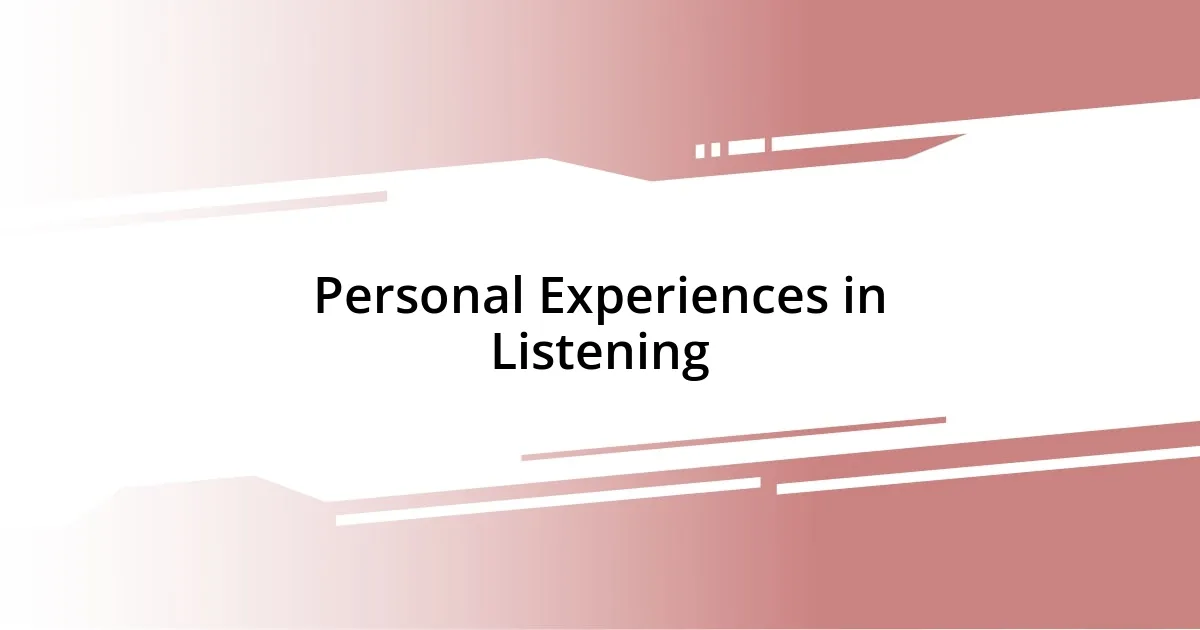
Personal Experiences in Listening
Listening is more than just hearing words—it’s about connecting on a deeper level. I vividly remember a moment during a family gathering when my younger sister opened up about her struggles. I put aside my phone, leaned in, and focused entirely on her. That small act of giving her my full attention helped her feel valued and understood, forming a bond that strengthened not just our relationship, but also my empathy.
In my work life, I learned the hard way just how crucial listening is during negotiations. I once participated in a meeting where tensions ran high, and I noticed one team member getting visibly frustrated. By choosing to listen to his concerns rather than jumping in with my own agenda, I found common ground that ultimately led to a win-win outcome. It’s fascinating how a single act of attentive listening can change the entire atmosphere and direction of a conversation, isn’t it?
I’ve also had moments where my eagerness to respond overshadowed my ability to truly listen, particularly during late-night study sessions with friends. When one of them was sharing worries about impending exams, I quickly jumped to offer tips without fully absorbing his anxiety. Looking back, I see how my impatience missed an opportunity to provide emotional support. Listening is a skill that requires mindfulness—something I continuously strive to improve.
| Experience | Insight |
|---|---|
| Family Gathering | Deepened bond with my sister through active listening. |
| Work Negotiation | Found common ground by listening to a frustrated team member. |
| Study Session | Recognized the importance of emotional listening over problem-solving. |
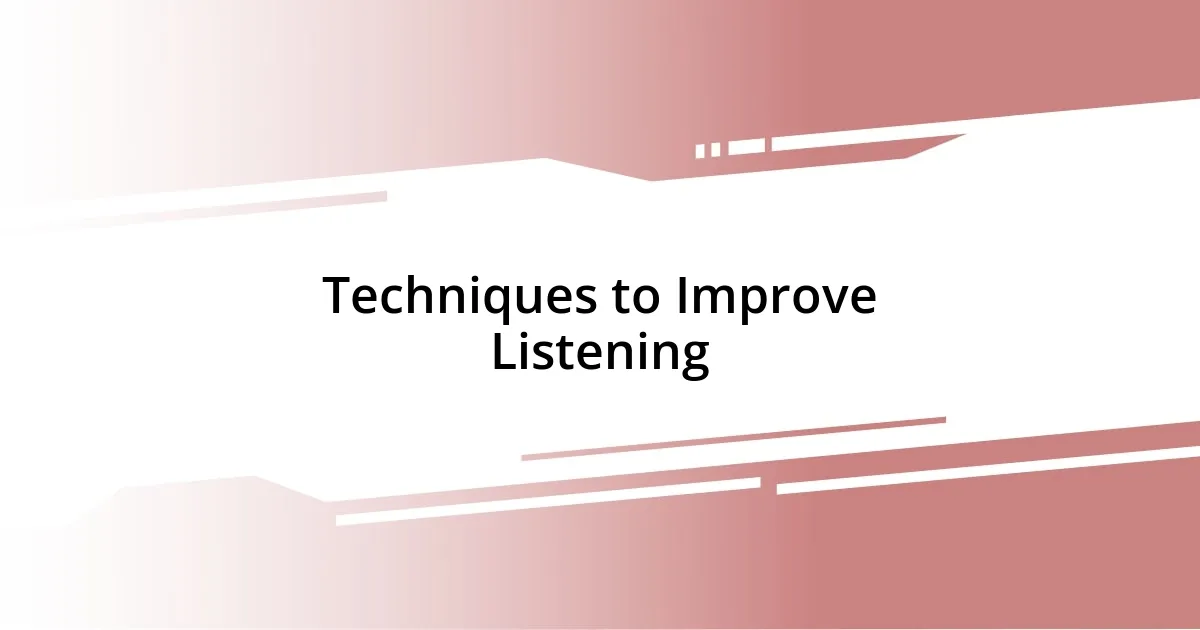
Techniques to Improve Listening
Improving listening skills requires intentional effort and a few practical techniques that I’ve found personally effective. One technique is to practice active engagement during conversations. I recall an instance in a book club where I made an effort to maintain eye contact and nod occasionally; this not only made the speaker feel valued but also helped me retain more information. When we focus on the speaker’s words rather than our responses, understanding blossoms.
Here are some techniques I’ve found valuable in honing my listening skills:
- Eliminate distractions: I often put my phone away or silence notifications so I can concentrate fully.
- Ask clarifying questions: This not only shows interest but also ensures I grasp the speaker’s points accurately, as I did when I asked a friend about her feelings during a tough transition.
- Paraphrase: When I restate what someone has said, it reinforces my understanding and signals that I’m engaged.
- Practice mindfulness: During conversations, I take a deep breath to ground myself, allowing me to be fully present.
- Reflect on emotions: Tuning into the speaker’s emotions has been a game changer for me; when one of my coworkers shared personal struggles, acknowledging her feelings fostered deeper trust.
Emphasizing these techniques in my daily interactions has not only amplified my comprehension but also enriched my relationships.
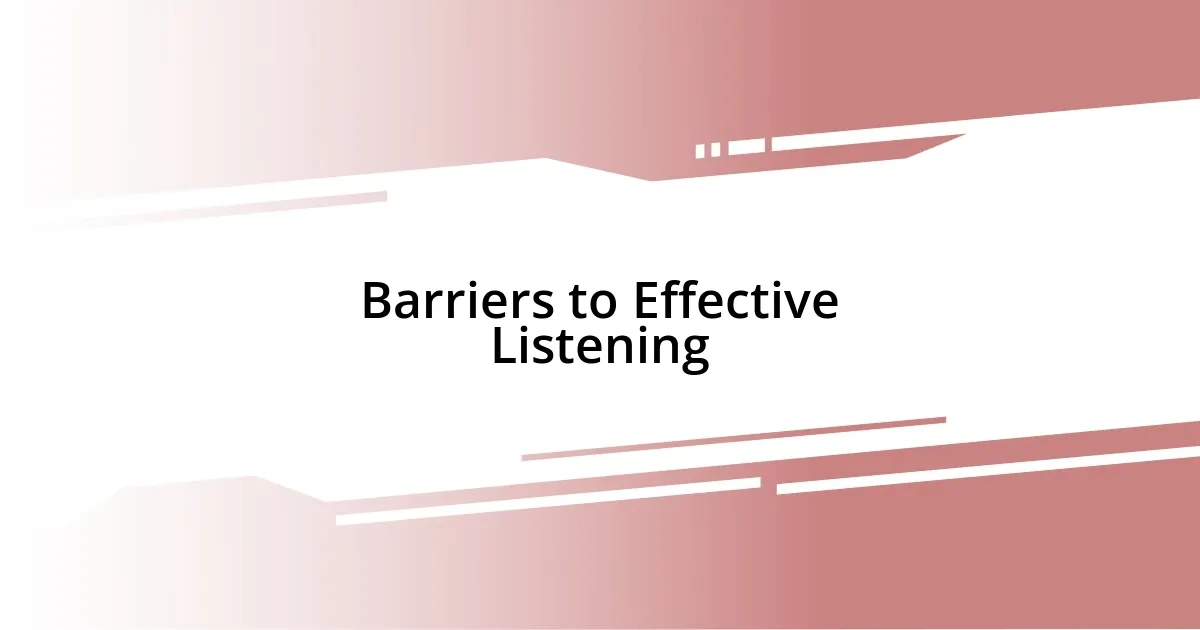
Barriers to Effective Listening
When thinking about barriers to effective listening, I can’t help but recall times when my own preconceived notions got in the way. I remember sitting in a team meeting, where I was convinced I understood the problem at hand. However, my need to be right led me to dismiss what others were saying. That mindset not only clouded my judgment but also stifled collaboration. It makes me wonder—how often do we allow our biases to drown out voices that could provide valuable insights?
Another hurdle I’ve faced is the influence of external distractions. There was a moment I was catching up with a friend at a café, and the chatter around us was overwhelming. My attention kept flickering between their words and the noise in the background. I realized that this lack of focus not only affected my understanding but also made my friend feel ignored. Can you relate to that feeling when you’re talking, but it seems the other person isn’t really there? It’s a reminder that creating a conducive environment for listening is essential.
Finally, emotional barriers also play a significant role. I vividly recall a time when I was preoccupied with my own worries during a conversation. A family member tried to share something important, but my anxious thoughts were too loud. I respond to my stress by shutting down rather than truly hearing them out. This experience taught me that to listen effectively, I must first address my emotional state. Isn’t it interesting how our own feelings can create walls that keep us from connecting deeply with others?
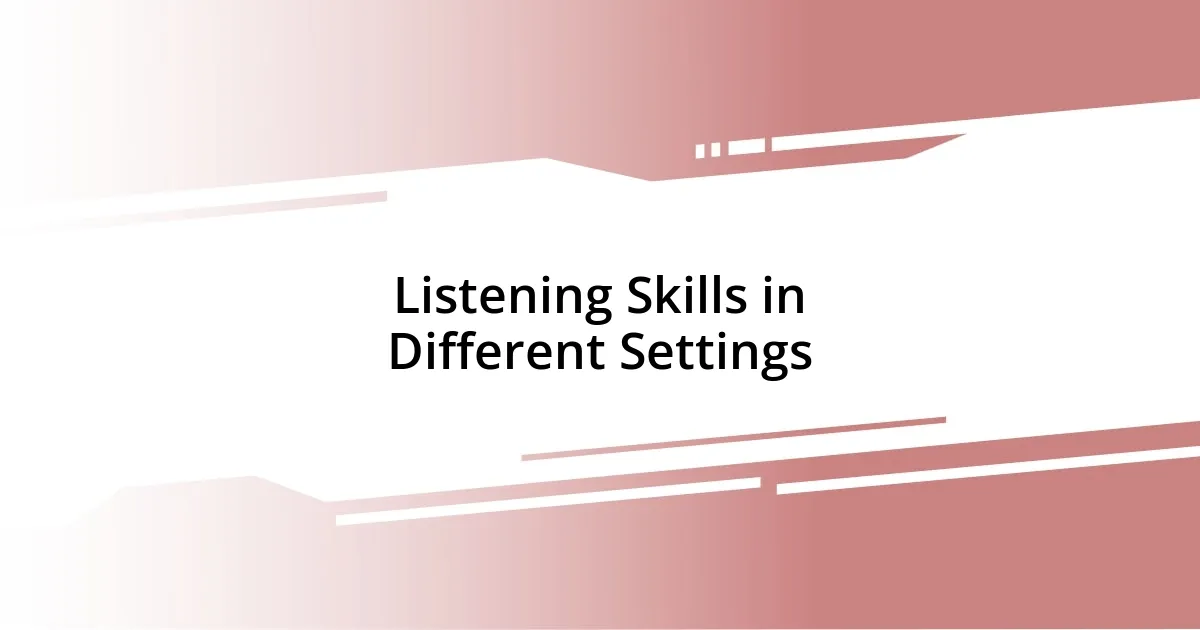
Listening Skills in Different Settings
In professional settings, I’ve noticed that listening can often be overshadowed by the hustle of busy agendas. During a recent quarterly review meeting, I made a conscious effort to truly listen to my colleagues’ presentations instead of thinking about my own next point. By doing this, I not only absorbed innovative ideas but also created a space for follow-up questions that sparked deeper conversations. Isn’t it fascinating how listening attentively can unlock new opportunities for collaboration?
Social settings present a different kind of challenge. I remember attending a gathering where friends were exchanging stories about their travels. Initially, I found myself waiting too long to jump in with my own anecdotes, which made me feel disconnected. But once I started reflecting on their experiences and providing thoughtful responses, I felt a shift in our energy. The excitement of sharing and listening in return fostered a connection that enriched the entire evening. Can you recall a moment when listening transformed a casual chat into something more meaningful?
In more intimate or personal contexts, such as conversations with loved ones, I’ve found that effective listening involves a certain attunement. One evening, I sat with my partner, who was feeling overwhelmed with work. As I engaged in active listening—leaning in, maintaining eye contact, and validating their feelings—I noticed how much my presence mattered. It struck me that sometimes, the act of listening is not about solving problems but simply sharing space and understanding. Isn’t that the beauty of human connection?
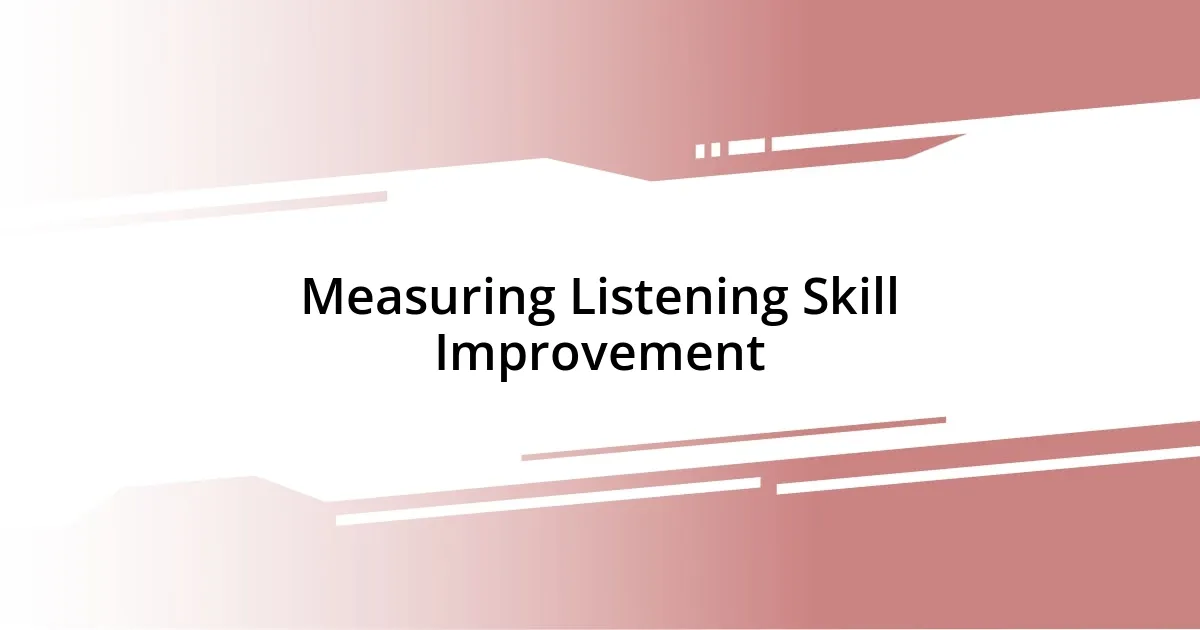
Measuring Listening Skill Improvement
Measuring improvement in listening skills can be quite revealing. I recall a moment when I decided to track my interactions with colleagues over a month. By journaling how often I paraphrased or asked clarifying questions, I was able to see tangible growth. It was interesting to note how these small changes enhanced not only my understanding but also improved team dynamics. Have you ever tried self-reflection as a tool for growth?
I’ve also found that gathering feedback plays a crucial role in assessing my listening capabilities. After engaging in discussions, I started asking friends and colleagues for their thoughts on my attentiveness. Their insights were often enlightening; they noted the changes I hadn’t truly recognized in myself. Isn’t it fascinating how external perspectives can shine a light on our growth areas?
Tracking non-verbal cues has become another effective measure for me. In conversations, I began to pay close attention to how well I engaged—eye contact, nodding, and even mirroring body language communicated my attentiveness. When I made a conscious effort to improve in these areas, the connections deepened, and conversations felt more rewarding. Have you ever considered how much your body language speaks about your listening skills?
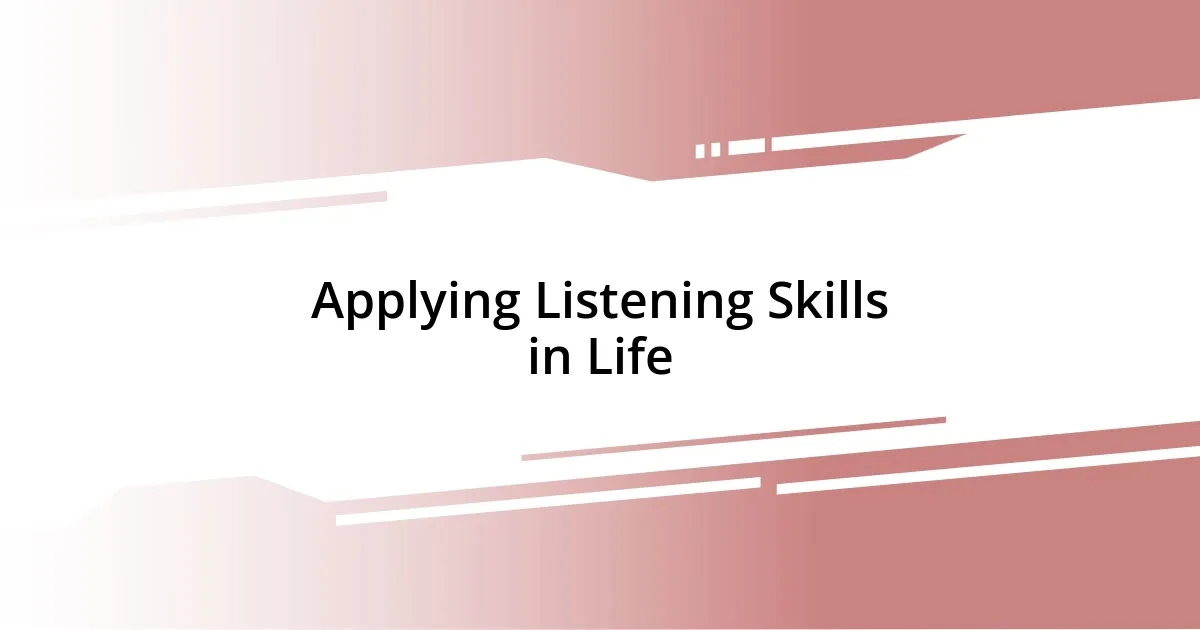
Applying Listening Skills in Life
Applying listening skills in life can shape our interactions significantly. I recall a time when my sister was going through a tough break-up. Instead of offering advice, I simply sat beside her and listened. As she poured her heart out, I realized how powerful it was to just be a soundboard. This experience taught me that sometimes, listening isn’t just about hearing words; it’s about embracing someone’s emotions and providing comfort through presence. Have you ever felt the weight of silence melt away with genuine listening?
In my daily routines, I make it a point to engage actively with baristas and cashiers during brief encounters. One morning, at a local café, I asked the barista how her day was going, truly listening to her response. This small exchange transformed an ordinary act into an uplifting moment, sparking a smile and a warm conversation. I found great joy in the realization that even fleeting interactions could foster a sense of community through attentive listening. Isn’t it fascinating how simple acts can really brighten someone’s day?
Moreover, applying listening skills has greatly influenced how I approach conflict resolution. I recall a disagreement with a family member where emotions ran high. Instead of jumping to conclusions, I chose to listen to their side intently. By doing so, I discovered underlying concerns that had gone unheard. This self-awareness not only diffused tension but also led to a more constructive dialogue. Have you ever noticed how listening deeply can turn a potential argument into a productive conversation?

